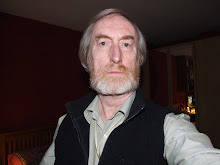My resurrected walking exercises have reminded me of the now-infamous five-a-side football disaster. And, curiously, so has a short story I was reading at breakfast. It's called "Texts", by Ursula LeGuin. In it, her heroine notices how much text there is around her. To steal one of her lines, I may be the only person in America, perhaps the world now, not wearing an advert. But she begins to notice more. On the beach, the incoming tide scribbles incoherently to her, then knitted scarves and pullovers trumpet short repetitive phrases, and finally, she finds hand-embroidered lace communicating long, elegant ideas.
Well, when I damaged my knee, I began to notice that the little veins on the surface above it were beginning to bruise, the way you see when people old enough to know better wear shorts. As the days turned into weeks, a definite message appeared. Unambiguously, and no doubt with feeling, they formed themselves into the text "F U". I hoped my knee would feel better for having got that off its chest (if you see what I mean). But it didn't. It's still there. In fact, I now notice there is another message appearing. It seems to be starting with an "S".
The answer to the naming of this Glasgow lies with one George McCall, born, apparently, in Glasgow, Scotland, who came here at the beginning of the 18th Century and started a forge. He did this on land that he bought from John Penn, the son of William, the man who founded this colony. The land came to be known as "McCall's Tract", and the forge as "McCall's Forge". This was back in 1725 (although he didn't actually buy the land till 1735). It quickly came to be known as "Glasgow Forge", and has lasted ever since, with a Glasgow Iron Works exisiting almost to the Second World War. But it should be noted that it was a forge (wrought iron) rather than a furnace (cast iron).
There were quite a number of forges and furnaces about the area, and with names like Colebrookdale, Warwick, Coventry, Reading, so my guess would be that said George McCall deliberately named it "Glasgow" after his birthplace. That makes it one of the few actually named after Glasgow in Scotland, and, possibly, the first.
There were quite a number of forges and furnaces about the area, and with names like Colebrookdale, Warwick, Coventry, Reading, so my guess would be that said George McCall deliberately named it "Glasgow" after his birthplace. That makes it one of the few actually named after Glasgow in Scotland, and, possibly, the first.
George McCall was a successful Philadelphia merchant, and, from the amount of land he bought, a man of some means. He was on Philadelphia City Council in 1722.
Later that night, I got caught up in thinking out the shape of all this writing. I think I worked it all out. But since it was so important, I neglected to write any of it down. And since it was later that night, I can't remember any of it. Oh, well.




No comments:
Post a Comment